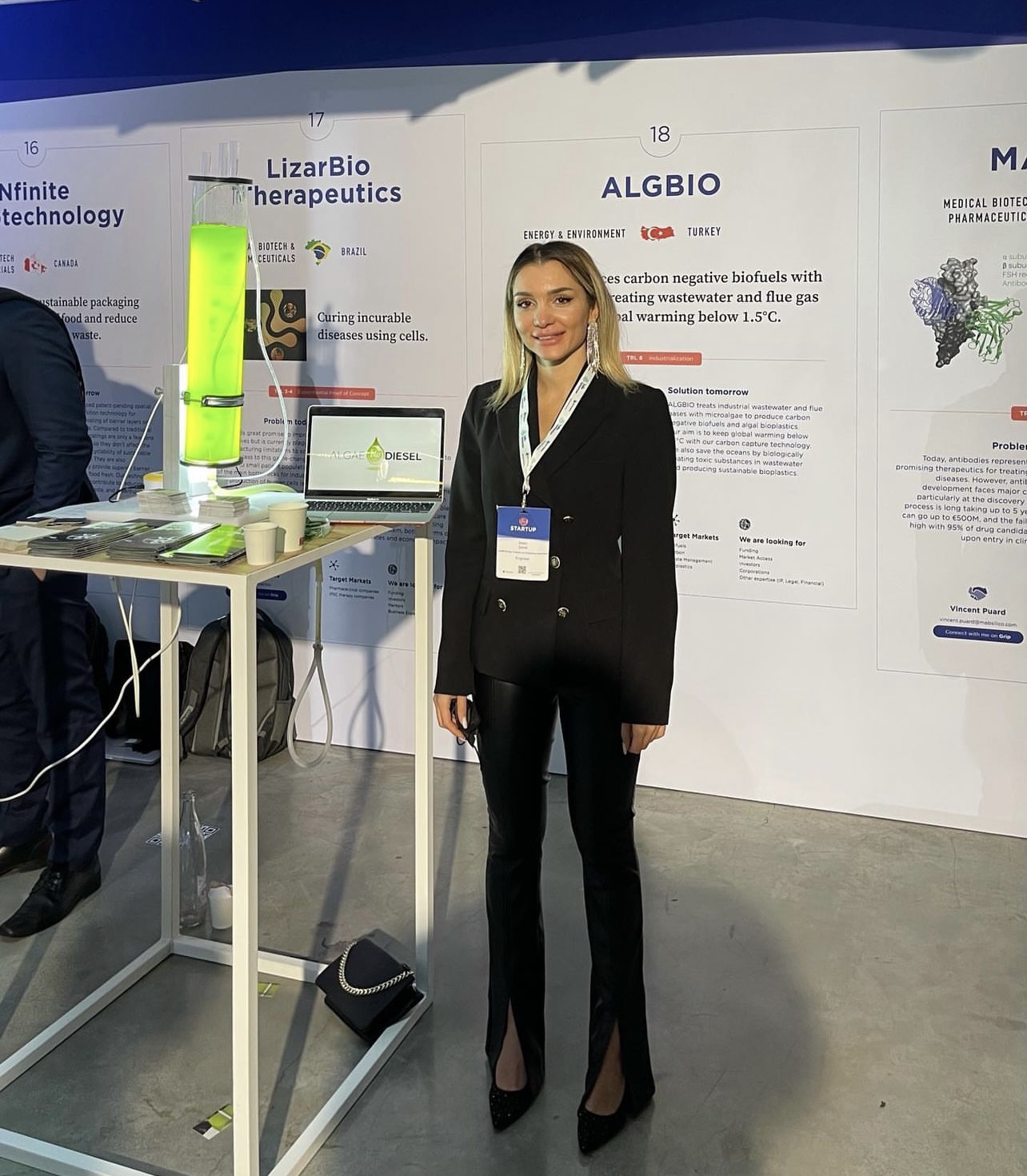Ne işe yarar
Algbio utilizes microalgae to capture CO2 and treat wastewater, converting these into biofuels and bioplastics, thus reducing emissions, improving water quality, mitigating climate change, solving issues like marine and air pollution, fossil fuels, plastic.
İlham kaynağın
The inspiration arose from awareness of environmental challenges, both academically and personally observed by Algbio's founder, a bioengineer specializing in algae. Istanbul, a vast metropolis, faces severe issues with mucilage in its waters and pervasive CO2 emissions, severely impacting biodiversity. With extensive expertise in these areas, the founder witnessed problems firsthand and was driven to harness the potential of microalgae to address them with engineering strategies. Algbio’s innovation uses microalgae to treat waste, capture CO2, produce sustainable bioproducts fostering a circular economy by mitigating environmental impact.
Nasıl Çalışıyor
In Algbio's bioreactors, Raceway Ponds, microalgae are cultivated to treat wastewater by absorbing pollutants like nitrogen, phosphorus etc. thereby purifying the water and producing oxygen through photosynthesis. Concurrently, these algae capture CO2 emissions from industrial sources or directly from atmosphere, converting CO2 into biomass. This biomass is harvested and processed to produce biofuel, providing a renewable energy source that meets ASTM standards and is suitable for aviation, marine, and transportation applications. The residual or direct biomass is then blended with plant-based additives to produce algal bioplastic granules and filaments, which are biodegradable and petroleum-free, adhering to ISO standards. This comprehensive utilization of microalgae maximizes resource efficiency and minimizes waste, supports a circular economy model by turning waste and carbon into value, contributing to carbon neutrality and environmental protection.
Tasarım süreci
Initial laboratory-scale prototypes focused on optimizing microalgae growth and testing their effectiveness in nutrient uptake and CO2 capture. Scaling up, Algbio established a 3-ton capacity operation, where advanced engineering strategies were implemented. Key among these was the use of raceway ponds, designed to maximize algal growth for enhanced carbon capture and wastewater treatment. These ponds provided ideal conditions for algae, enabling the removal of up to 95% of pollutants such as nitrogen and phosphorus, surpassing traditional methods. Biofuel production from microalgae which treat waste was rigorously tested to meet ASTM standards, more cost-effective than conventional biofuels and compatible with existing engines without modifications. Concurrently, the production of bioplastics from microalgae involved sophisticated engineering processes to create algal bioplastic granules for plastic injection and filaments for 3D printing that tested for ISO, ensuring they were biobased and free of petroleum-based polymers. Algbio's innovations, validated through patent applications for its biofuel and bioplastic production technologies, highlight its commitment to sustainable manufacturing and environmental protection through advanced engineering solutions.
Nasıl bir farkı var
Algbio's design stands out for its integration of advanced bioengineering strategies and the use of microalgae in RWP-bioreactors for simultaneous wastewater treatment and CO2 capture, achieving up to 95% pollutant removal. This system purifies water while converting CO2 into oxygen and biomass, with each kg of algal biomass capturing up to 1.5 kgs of CO2, contributing to carbon sequestration and potential carbon credits for trading in carbon markets. Algbio's biofuels are cost-effective, meet ASTM standards, and require no modifications to existing fuel systems. Algbio’s bioplastics are biodegradable and free of petroleum-based polymers, tested for ISO standards. By employing optimization engineering for bioreactors, Algbio enhances algal growth and metabolic efficiency, producing biomass rich in nutrition, which can be used for biofertilizers, superfoods, animal feed. This maximizes resource utilization and minimizes waste, supporting circular economy model.
Gelecek planları
Technically, we aim to advance our technology readiness level to TRL 9, achieving full commercial deployment. This includes increasing the capacity of our RWP-bioreactors and optimizing our bioengineering processes by investing in R&D. We plan to expand globally by entering new markets with high levels of industrial pollution, emissions. We will pursue international IP rights to protect our innovative technologies and ensure a competitive advantage. Our future goals align SDG 6-7-9-12-13-14-15, by advancing our treatment and carbon capture capabilities, we aim to significantly reduce CO2 emissions and mitigate global warming.
Ödüller
Fortune 40under40 - Turkey GIST First Place-USA Outstanding Woman Entrepreneur USA Global Social Impact Award - USA SheLovesTech Singapore First Runner up European Commission WomenTech EU grant (HORIZON), funded by EU Innovative Water Solutions 3rd place Lisbon



İletişim/Bağlan